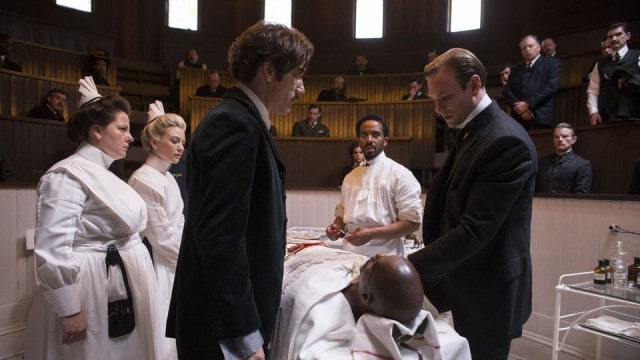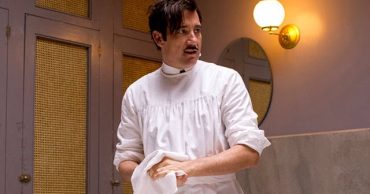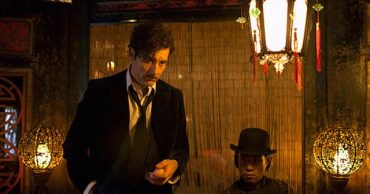
You know what my problem with The Knick is? It’s bad cake.
It’s got it all backwards, you see. The thing about cake is that it’s about the sum of its parts, not the parts itself. You wouldn’t eat a raw egg (well, some of us would), or flour, or whatever the hell else goes into cake (milk?). But when you add it all together, you get something wonderful. You get something greater than the parts themselves.
A TV show is the same way. The things that go into it don’t make sense on their own. Arcs with proper context, or plots without proper set up, are as unsatisfying as eating a raw egg. They need to be mixed together so that they interweave; so that they tell a whole, complete story.
But The Knick is bad cake. Someone took sushi, and really crispy bacon, and a cooked-medium filet and mixed it all up and baked it nice and brown, and it sucks.
* * * * *
Let me give you an example.
Algernon Edwards is the son of two domestic servants, both of whom server the Robertson family. He is black, and the Robertsons are white. The Roberstons were responsible for him getting his education, and have generally been as supportive as a white person could be in the early 1900s; which is to say, not enough, but they are still a sight better than almost everyone else. Algernon clearly respects them, and is grateful to them. He has, always, even in the worst moments, believed that they would protect him, or at least not leave him behind. That is perhaps his one constant in a world that piles indignities and violence on top of him; there was at least one person in power that would could feasibly protect him.
And then we find out that Captain Robertson can’t.
Or, rather, won’t. He’ll stick his neck out when he can put his boot on everyone else’s, but when it comes to him and his, he protects himself. That is a devastating revelation, and one that clearly breaks Algernon’s heart. Someone that Algernon has always thought had his back never really did. All of the talk of progressiveness and moving the world forward is fine when you don’t have to make personal sacrifice, but when the chips are down, Robertson left Algernon in the cold.
That should hit like an anvil! That should drop Algernon to his knees! It should drain whatever hope he had from him, and change him as a character! It should be given the proper care that Algernon deserves as a character.
But it doesn’t. It’s a thread of a story that we pick up and drop. It’s as if we’re looking at a loom; all of the strands of story and plot and character are all lined up next to one another, ready to be woven into a coherent hole, but instead are just left as individual strands. They are being plucked randomly.
And that’s wrong. You shouldn’t be able to pluck Algernon’s character arc and not have it pluck something else as well. Each thread should reverberate in other threads, so that when it’s all vibrating at once, it makes music. There’s no music here. It’s just notes; it’s as if a brilliant musician is practicing a piece for the first time, and just playing the notes in sequence, without any of the rhythm or artistry of a performed piece.
* * * * *
There is so much that is good here.
Bertie and Genevieve’s budding love story is sweet, and funny, and awkward. They are actually enjoying the lives they live. Not everything is so serious and final and dark. Bertie wears a top hat and a towel, and Genevieve giggles. They dance at the charity ball, and they aren’t caught up in the machinations of the world around them. While Elkins schemes to use Henry to further her own goals, and Cornelia survives her father-in-law, and even as Phillip brags to Henry about his use of gasoline, they are in a different, better world.
Harry and Cleary, too; god, how these two make soar. People are so surprised, and disbelieving, when they find out that Harry and Cleary aren’t sleeping together. Why else would a man and a woman share a home? But there’s real compassion, and respect, and these two need each other just as much as Bertie and Genevieve do. Cleary is the one hero on this show that I believe in, and Harry the one heroine. They are both too easily forgotten and spit upon by the world around them, but for all of the posturing about the uselessness of the lower class, in the end they will have done more than most to improve the lives of young men and women.
And Gallinger! Oh, Gallinger! To do what he did to Algernon; it’s as if Gallinger laid him down on the table and neutered him. I thought his plan was just to embarrass Algernon, but no; it was to show that no matter how far a black man goes, he will always be inferior to the white man. A white man can save a black man, the newspapers will read, but the blacks cannot save themselves. To castrate poor boys and to talk about the need to protect the white race is the work of an unfeeling monster; to do what Gallinger did requires the deepest of feelings. In his desire to castrate Algernon, he revealed himself to be the most emotionally self-aware character on this show, and one of its most evil human beings.
But it doesn’t quite add up.
It doesn’t create a show that feels whole. I can taste The Knick‘s storylines individually, but as one dish, they fail. In order to enjoy The Knick at the height of its powers, one must separate the parts they like from the ones they do not, and sample that ingredients over and over again. You even see it in the way that the show is portrayed in the media— the brilliance of Soderbergh’s directing is the thing that makes The Knick so buzz-worthy. But his direction is at odds with the writing, and the writing at odds with the performances, and the performances at odd with the directing, and around and around we go.
* * * * *
Three more episodes to go.
[Photo via Cinemax]
 Follow Us
Follow Us





